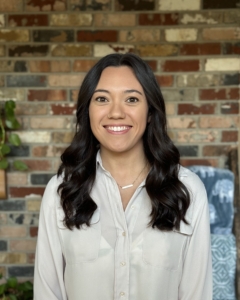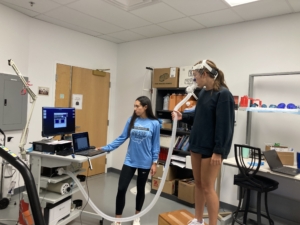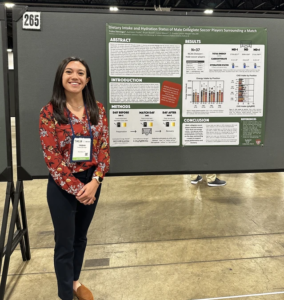The 2024 Master’s Mandate is here and to become a registered dietitian, all RD2Bes must now get a master’s degree to sit for the CDR Exam. But what about those individuals who wish to go beyond a master’s degree to pursue a Ph.D.? One of our own BWS DI faculty advisors, Trisha Sterringer, MS, RDN, CSCS, did just that and was kind enough to share her experience.

BWS DI Faculty Advisor Trisha Sterringer, MS, RDN, CSCS
1. What is your Ph.D. program?
I am a third-year Doctoral Candidate in the Nutrition and Exercise Metabolism Lab at Virginia Tech. My degree is in Human Nutrition, Foods, and Exercise. My dissertation research is focused on performance nutrition, energy availability, and bone health in active populations.

Trisha working in the Nutrition and Exercise Metabolism Lab at Virginia Tech
2. Tell us a little about your background and what you did before returning to school.
I have always had an interest in nutrition and exercise. I played a lot of sports growing up which led me to pursue a Bachelor’s in Sports Nutrition from the University of Cincinnati. Then I completed a combined Master’s and Dietetic Internship in Public Health Nutrition at Case Western Reserve University in Cleveland, Ohio. It was through this internship program that I was introduced to the dietitians at Be Well Solutions. I was lucky enough to join the staff in 2018 as a Wellness Dietitian and then in 2020 I was promoted to the Director of Nutrition Services. It was in this role that I was able to combine my interests in nutrition and exercise in a way that promoted employee wellness and disease prevention.
3. What was your RD2Be journey like?
Bumpy! I wouldn’t say I have a completely Type A personality, but I would definitely describe myself as a planner. But my RD2Be journey did not go as planned (thankfully it turned out even better). When I applied to internships my senior year, I applied to DI-only programs. I was definitely not interested in a Master’s degree. And then the email came back from DICAS… I didn’t match. I was devastated. I thought I did everything I was supposed to do. I had an almost perfect science GPA, I volunteered in the diet office of a hospital every week, I had great letters of recommendation, how did I not match?! But looking back, it was the best thing that ever happened to me. Because I didn’t get my first choice of internships, I decided to apply to combined MS/DI programs. I ended up accepting a spot at Case Western and it was there that I first fell in love with research.
4. Did you always know you wanted to get your Ph.D. or was this something you decided after becoming a registered dietitian?
Young Trish had no intention of getting a PhD. I didn’t even want to get my Master’s! But thankfully, life worked out differently. At Case Western I had a mentor who encouraged me to consider pursuing a PhD after graduation. However, I was eager to start working and didn’t think a PhD was the best route for me at the time. Then 4 years later the same mentor reached out to me and encouraged me to apply for the doctoral program at Virginia Tech. I loved worksite wellness, but I knew my ultimate career goal was to work in research. I am really thankful for that mentor and her encouragement. Sometimes other people see potential in us before we even see it in ourselves.
5. Do you think it’s best to work as a registered dietitian before returning for a Ph.D.?
Some people might want to debate me on this, but I definitely think it’s better to work for a couple years before pursuing a PhD. Many PhD students get the opportunity to teach classes and real world experience can be shared in the classroom to enhance learning. It can also help you identify the area of nutrition you want to focus on during your doctoral work. The PhD is a very specialized degree and you can come up with some interesting research questions by working in clinical or applied practice first. However, it can be harder to go back to school after you’ve started working, so that is one possible drawback.
6. What advice would you offer to anyone considering a Ph.D. in Nutrition?
My first piece of advice is to really ask yourself why you want a PhD. Typical PhD programs in America are 3-5 years or even longer. The living stipend during your PhD is nothing to brag about and it usually isn’t enough to save much for retirement during those years. If you decide to go into academia, you will probably do a post-doc which is another 2-3 years after graduation where the pay is about the same as an entry-level dietitian. My point is that people who pursue doctorate degrees do it for the love of the research, not the money. So make sure it’s something you really want to do before going down that path. My second piece of advice is to make sure you pick a lab with an advisor that you can get along with. You will be working with the same advisor for 3+ years and if you don’t work well together it could make those years very difficult. If you can, speak with current graduate students in the department or that lab specifically to see how their experience has been. And my final piece of advice is to ask about funding for your position. Look for PhD programs that offer graduate assistantships to cover tuition and a living stipend.

Trisha presenting on the Dietary Intake and Hydration Status of Male Collegiate Soccer Players Surrounding a Match
7. What career options are there for those with a Ph.D. in Nutrition?
Dietitians with a PhD can work in academia, industry, research, and for the government. In academia, dietitians with a PhD can have roles in teaching, research, and/or administration. Industry dietitians can work for companies that manufacture commercial foods, pharmaceuticals, medical devices, and other health-related services. Those interested in sports nutrition could pursue research positions with professional sports teams or with companies such as PepsiCo which runs the Gatorade Sports Science Institute. Government research positions can be found within the NIH, USDA, and United States Military.
8. Do you have any resources to share with someone interested in learning more about nutrition research or wanting to go back to school for their Ph.D.?
The American Society for Nutrition has a Graduate Program Directory that is divided into online, in-person, and international programs. This is a good place to start when exploring the programs available. https://nutrition.org/meetings/graduate-program-directory/
The Academy also as a Research DPG: https://www.researchdpg.org/home
I recommend being a member of this DPG if you are interested in learning more about research opportunities or connecting with other research dietitians.
The NIH offers a free course on Clinical Research: https://ocreco.od.nih.gov/courses/ippcr_info.html
This is a crash course on designing and implementing clinical research studies. Even if you don’t pursue a PhD, I think this course is helpful to improve understanding of research protocols and being able to critically analyze published research studies.
9. Based on the research you’ve been doing, what is one thing that really surprised you or an interesting takeaway you’d like others to know?
Research is hard! There is no such thing as a perfectly designed study and there will almost always be confounding factors that can’t be avoided. This is why it is so important for dietitians to have a solid understanding of how to read and analyze published research.
10. What is one thing you love about being a registered dietitian?
This is a unique career where you can continue to give back to the next generation in several different ways. I have had the privilege of working with students as an internship preceptor, faculty advisor, practicum supervisor, and course instructor. I look forward to continuing working with RD2Bes throughout the rest of my career!
Want to learn more about Trisha? Check out her bio on our website.
Have a question? Leave a comment below, or send us an email at bwsdi@bewellsolutions.com! Don’t forget to check out our other posts on the BWS DI Blog for helpful tips during your dietetic internship and beyond.
